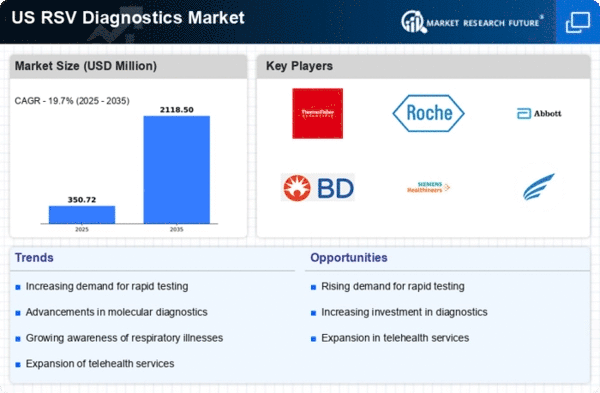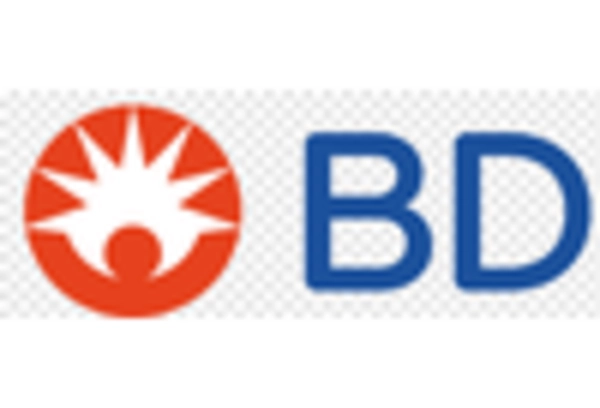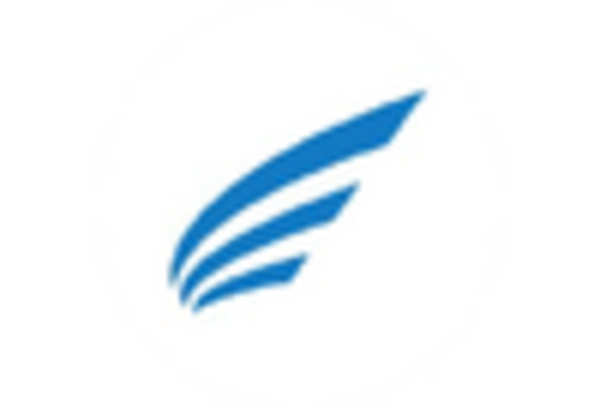Government Initiatives and Funding
Government initiatives aimed at combating respiratory infections are significantly influencing the rsv diagnostics market. Increased funding for research and development of diagnostic tools is evident, with federal agencies allocating substantial resources to enhance public health responses. For instance, the National Institutes of Health (NIH) has prioritized RSV research, which may lead to breakthroughs in diagnostic technologies. Such initiatives not only foster innovation but also encourage collaboration between public and private sectors, potentially accelerating the introduction of new diagnostic solutions. This supportive environment is likely to bolster the rsv diagnostics market, ensuring that effective tools are available to manage RSV infections.
Rising Incidence of RSV Infections
The increasing incidence of respiratory syncytial virus (RSV) infections in the US is a primary driver for the rsv diagnostics market. Data indicates that RSV is responsible for a significant number of hospitalizations among infants and elderly populations, with estimates suggesting that RSV leads to approximately 58,000 hospitalizations annually among children under 5 years. This rising burden of disease necessitates the development and deployment of effective diagnostic tools, thereby propelling market growth. As healthcare providers seek to improve patient outcomes, the demand for rapid and accurate RSV diagnostics is likely to escalate, influencing the overall landscape of the rsv diagnostics market.
Increased Focus on Pediatric Health
The heightened focus on pediatric health is a crucial driver for the rsv diagnostics market. With RSV being a leading cause of respiratory illness in children, there is a growing emphasis on early detection and management of the virus. Healthcare providers are increasingly recognizing the importance of accurate diagnostics to prevent severe outcomes in vulnerable pediatric populations. This focus is supported by various health organizations advocating for improved screening and diagnostic practices. As a result, the rsv diagnostics market is likely to experience growth, as stakeholders invest in developing targeted diagnostic solutions that cater specifically to the needs of children.
Advancements in Diagnostic Technologies
Technological innovations in diagnostic methodologies are transforming the rsv diagnostics market. The introduction of molecular diagnostics, such as PCR and rapid antigen tests, has enhanced the speed and accuracy of RSV detection. These advancements allow for timely clinical decision-making, which is crucial in managing RSV infections effectively. The market is projected to witness a compound annual growth rate (CAGR) of around 8% over the next few years, driven by these technological improvements. As healthcare systems increasingly adopt these advanced diagnostic tools, the rsv diagnostics market is expected to expand significantly, catering to the growing need for efficient and reliable testing solutions.
Growing Demand for Point-of-Care Testing
The shift towards point-of-care (POC) testing is reshaping the rsv diagnostics market. Healthcare providers are increasingly favoring POC tests due to their ability to deliver rapid results, which is essential for timely treatment decisions. The convenience of conducting tests in various settings, including clinics and emergency departments, enhances patient care and satisfaction. Market analysis suggests that the POC segment is expected to grow at a CAGR of approximately 10% in the coming years. This trend reflects a broader movement towards decentralized healthcare, where immediate access to diagnostic information is prioritized, thereby driving the expansion of the rsv diagnostics market.
















